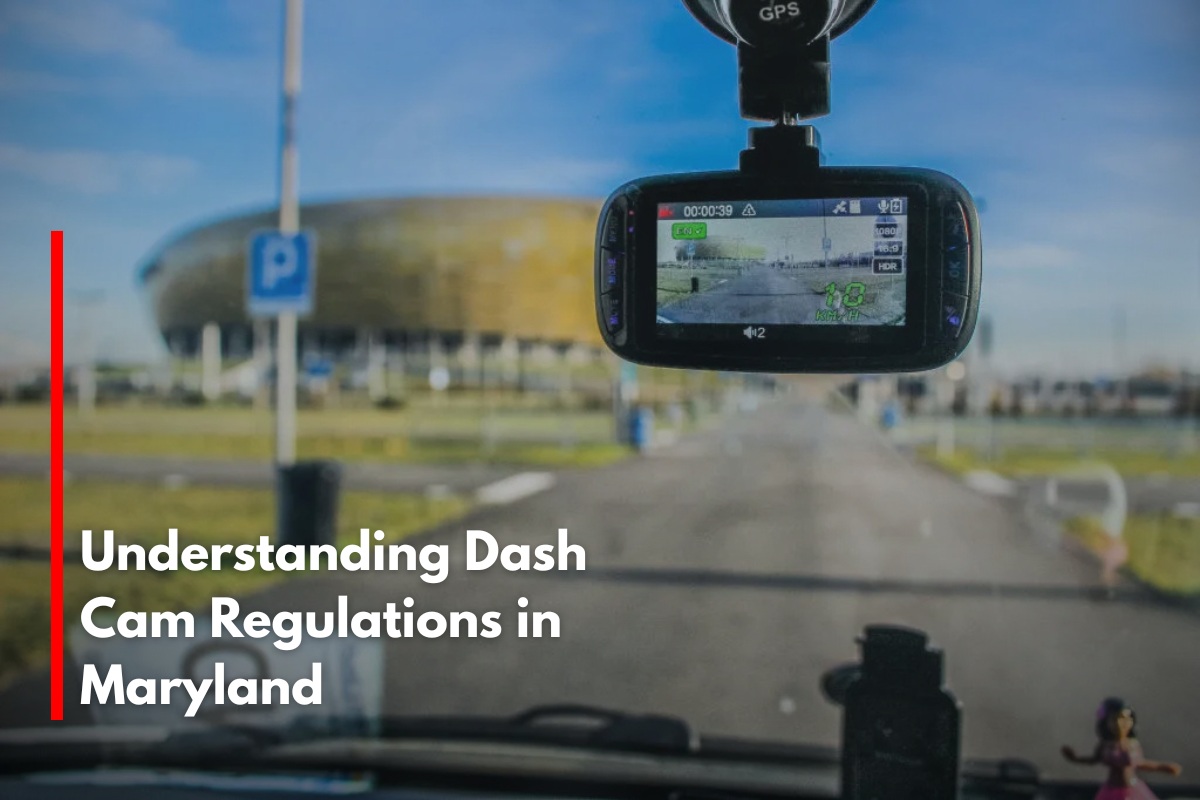Dash cams have become increasingly popular in Maryland as a tool for drivers to protect themselves by documenting their journeys and any incidents that occur on the road.
However, Maryland has specific laws and guidelines regulating the use, placement, and audio recording capabilities of dash cams to ensure driver safety and protect privacy rights. Understanding these regulations is essential for legal and effective dash cam usage.
Legal Status and Mounting Requirements
In Maryland, dash cams are completely legal and commonly used in private vehicles for recording video evidence, especially in the event of accidents or disputes. However, the state enforces precise rules on where dash cams can be mounted to avoid obstructing the driver’s view.
Specifically, dash cams must be installed either above the AS-1 line of the windshield (a line near the top edge of the windshield) or placed no lower than five inches below the windshield’s upper edge. There is also an allowance to mount dash cams in a seven-inch square at the bottom corner of the windshield.
These mounting restrictions aim to ensure the dash cam does not impair the driver’s visibility, reducing the risk of accidents due to blocked sight lines.
Devices mounted elsewhere, such as on the dashboard or rearview mirror, are also acceptable provided they do not obstruct the windshield view. Noncompliance with mounting rules can lead to fines or citations as the Maryland Motor Vehicle Administration considers obstructed views a safety hazard.
Video Recording and Privacy
Maryland law permits recording video of public spaces, traffic interaction, and other vehicles as long as the dash cam adheres to mounting rules. Recording activities on public roads and in parking lots is legal and footage can be highly useful for insurance claims or court evidence following accidents.
However, video recording inside the vehicle—especially capturing private conversations—raises privacy concerns. While video by itself is generally allowed, secretly recording passengers without their knowledge by capturing audio is regulated under Maryland’s strict wiretapping laws.
Maryland’s Two-Party Consent Law on Audio Recording
Maryland is a two-party consent state, meaning all parties to a private conversation must give consent to be recorded. This primarily affects dash cams with audio recording features. Recording audio inside a vehicle without passenger consent may constitute illegal wiretapping, potentially leading to criminal penalties.
To comply, many Maryland drivers either disable the audio recording function on their dash cams or inform all passengers that recording takes place, often signage inside car windows or verbal notice. Transparency is the best practice to avoid violating the law.
Use of Dash Cam Footage in Court
Dash cam footage is admissible as evidence in Maryland courts in civil and criminal cases if it is relevant and authentic. Authorities or insurance companies may accept video as proof during accident liability investigations or disputes.
To be accepted, videos must be properly authenticated, showing they haven’t been altered or edited. Maintaining the original footage chain of custody and avoiding deletion or tampering is important.
However, partial or misleading footage can be challenged. Thus, comprehensive recordings showing the entire incident are preferable.
Interaction with Law Enforcement
Maryland allows recording on-duty police officers during traffic stops or public interactions, so long as the dash cam does not obstruct the driver’s view or interfere with officer duties.
Police officers cannot lawfully order drivers to stop filming or delete footage. Attempting to seize cameras without a warrant may be unlawful, protecting citizen rights to record public officials.
However, if the dash cam interferes with safe driving, officers may have grounds to cite drivers for obstructions.
Practical Considerations for Maryland Drivers
Mount dash cams according to state guidelines above the AS-1 line or within specified zones.
Disable audio recording or obtain passenger consent to comply with two-party consent wiretapping laws.
Avoid placing devices that obstruct the windshield or driver’s view.
Preserve original footage to maintain its evidentiary value.
Inform passengers clearly about recording to avoid legal concerns.
Used correctly, dash cams help reduce liability, document accidents clearly, and promote safer driving behaviors, making them a practical car accessory in Maryland’s legal and road environment.
Dash cams offer Maryland drivers a valuable safety and legal tool, but the state’s specific regulations regarding mounting, audio recording, and privacy demand careful adherence. By following Maryland’s laws, drivers can protect themselves with high-quality video evidence while respecting privacy rights and safety standards.
Sources
(https://www.ddpai.com/blog/dash-cam-laws/)
(https://www.lepplerinjurylaw.com/blog/dashcam-footage-in-maryland-car-accidents/)
(https://www.portnerandshure.com/blog/2019/january/3-reasons-you-need-a-dash-cam-in-maryland/)
(https://triallawyersmaryland.com/can-police-seize-dashcam-maryland/)
(https://ricelawmd.com/is-dashcam-footage-admissible-in-maryland-car-accident-cases/)











